Artificial intelligence and advanced therapies are the focus of the ICS Conference, hosted by IGTP
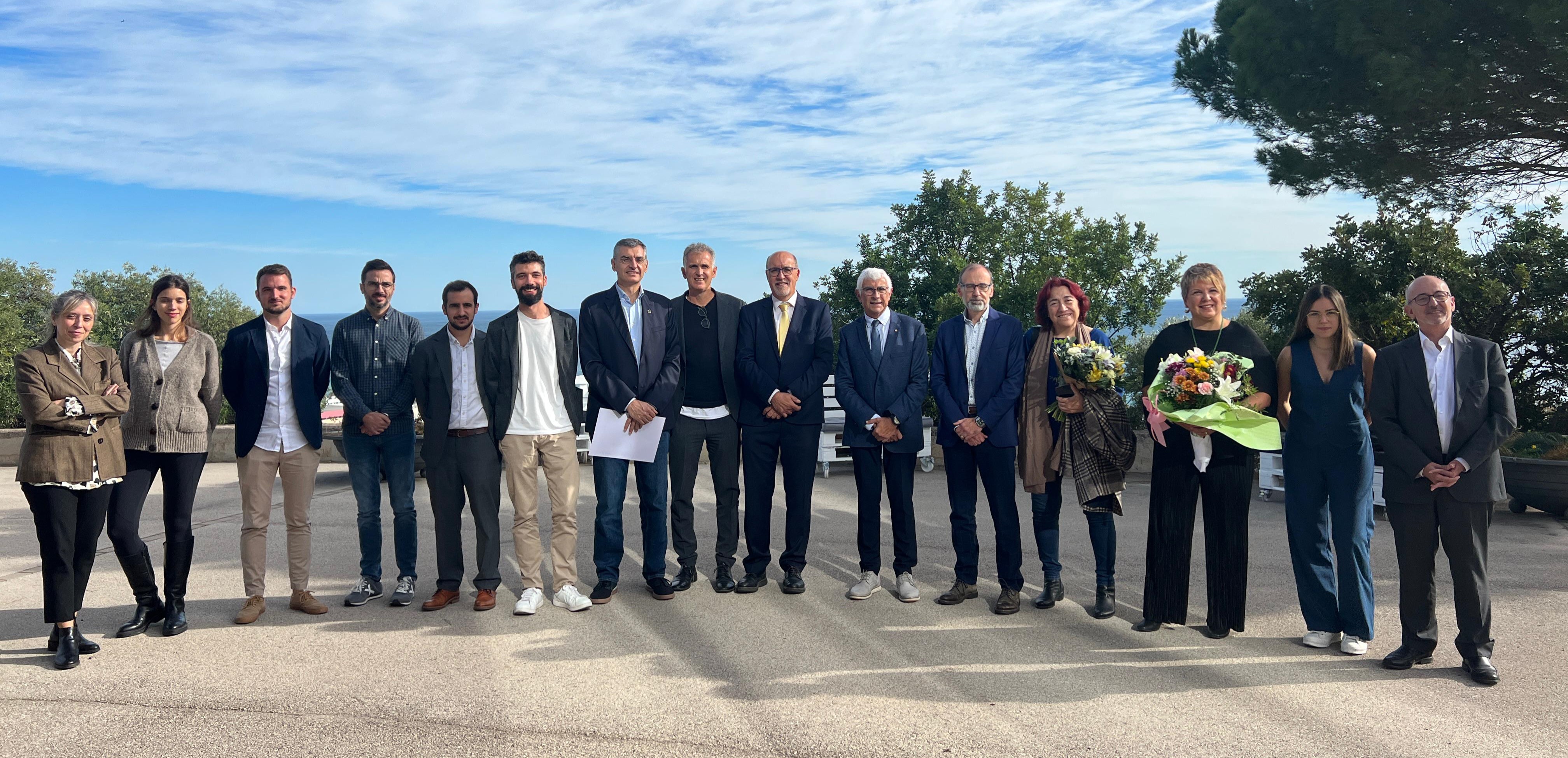
- Antoni Bayés and Alejandro Bustamante, who work at the Hospital and are researchers at the Germans Trias i Pujol Research Institute, were awarded a prize for the best hospital scientific career and ICS young researcher, respectively.
- The 14th Research Conference of the ICS focused on the transformative potential of research in the health system and awarded prizes to eight researchers.
Antibiotics or cancer treatments are examples of medical advances, achieved thanks to research, which have made it possible to combat diseases that were previously incurable. The 14th Research Conference of the Catalan Institute of Health (ICS) was held last Friday at the Badalona International Business Centre (BCIN) and focused on the new paradigms that are being developed and are called to be part of the clinical practice of the future. Artificial intelligence and advanced therapies should lead to precision medicine to improve both clinical practice and healthcare management. These, together with the advanced use of data, are some of the pillars of this edition of the Research Conference, which has been organised jointly with the Germans Trias i Pujol Research Institute (IGTP) as part of the 40th anniversary of the Germans Trias i Pujol University Hospital, and which has focused on the role of research as an agent of systemic transformation.
"The research of the present will be the medicine of the future and in order to have a much more personalised medicine it is essential to study everything that can be done with data and advanced therapies", explains Núria Radó, a technician at the ICS Office of Support for Innovation and Research and member of the Scientific Committee of the Conference.
The importance of data
The conference brought together more than 200 researchers and was inaugurated by Xavier Pérez, manager-director of the ICS, Julia Garcia, scientific director of the IGTP, and Jordi Ara, manager of the Metropolitana Nord. It began with a talk by David Torrents, vice-president of Bioinformatics BCN and ICREA researcher at the Barcelona Supercomputing Center, on how data are already transforming research. It also included a round table on artificial intelligence and data, with speakers such as the head of Intensive Care Medicine at the Hospital Universitari Joan XXIII, Maria Bodí; the head of Research and Innovation at the Office of the Delegate for Data Protection in the Health Department, Míriam Méndez; the epidemiologist of the Institut Universitari de Recerca en Atenció Primària Jordi Gol, Brenda León; the researcher of the Institut d'Investigació Biomèdica de Girona (IDIBIGI), Kai Vilanova, in a debate moderated by Xavier Serra, of the Office of Support for Innovation and Research of the ICS.
The second round table, moderated by the scientific director of the IGTP, Julia Garcia, focused on advanced therapies and precision medicine and included interventions by Antoni Bayés, researcher at the IGTP; Pere Barba, director of the Advanced Therapies Programme at Vall d'Hebron University Hospital; Ferran Barbé, from the Institute for Research in Biomedicine of Lleida (IRB Lleida) and Maria Molina, from the Bellvitge Institute for Biomedical Research (IDIBELL).
There was also a debate on how to transform clinical practice and health planning, moderated by the scientific director of EARTIS, Antoni Andreu, and which included interventions by the director general of Knowledge Transfer and Society, Laia Arnal; the researcher at the Barcelona Institute for Research in Biomedicine (IRB) Núria López-Bigas; and the director of Healthcare Innovation at the IGTP, Oriol Estrada.
Research Career and Research with Impact Awards
As in previous editions, the Research Awards of the ICS were presented during the conference. Among the winners were two IGTP researchers:
Award for Research Career in ICS Hospitals - ex aequo: Antoni Bayés Genís
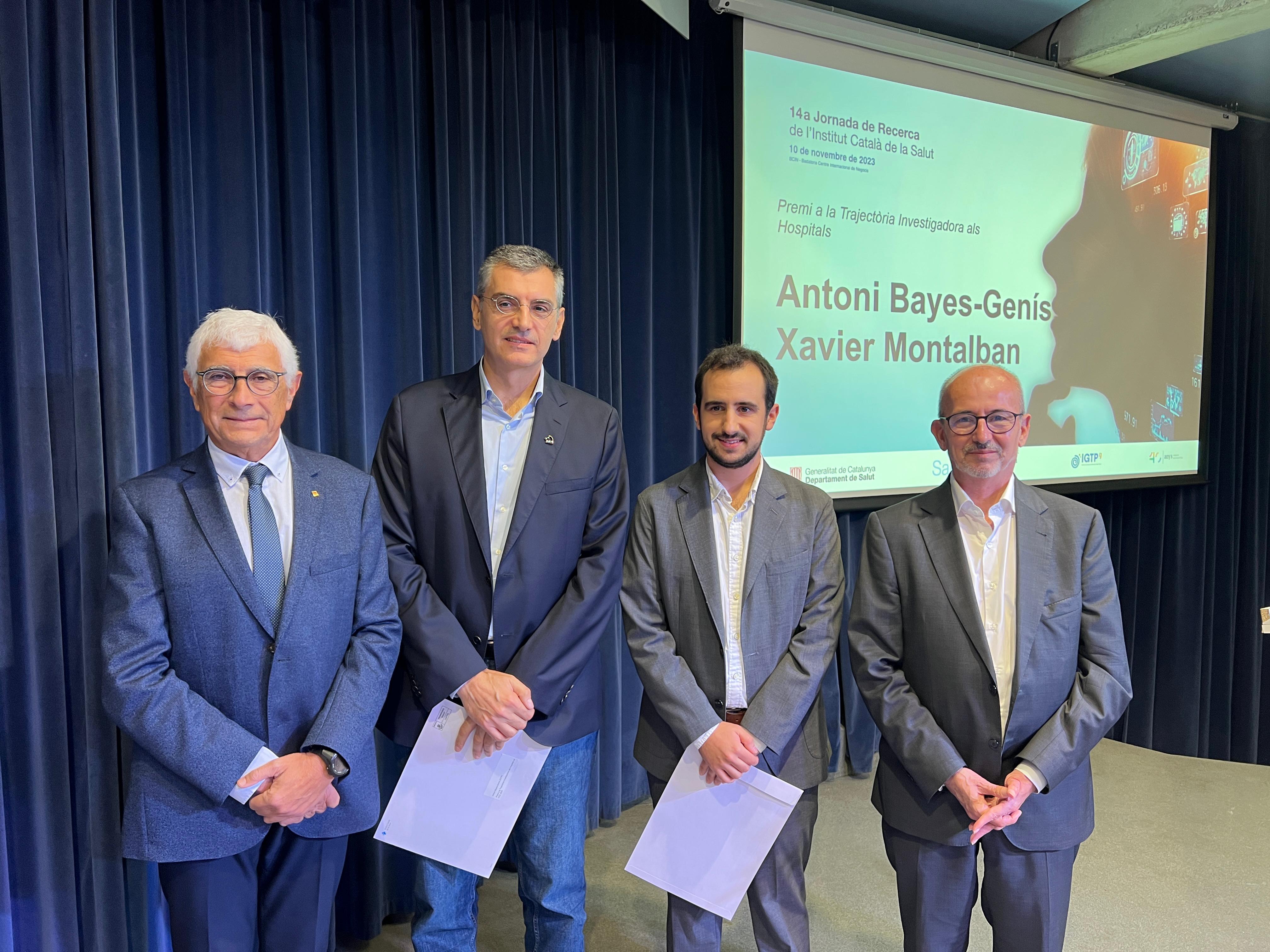
Clinical Director of the Heart Area of the Germans Trias i Pujol University Hospital, Doctor of Medicine and Professor of Cardiology at the UAB. He is also principal investigator of the Heart Failure and Cardiac Regeneration Research Group (ICREC) of the IGTP, and professor at the Faculty of Medicine of the UAB at the Can Ruti Campus. He is a world reference in the field of cardiology. His research in new biomarkers and biotherapies for personalised and precision care in cardiology stands out. He excelled in related research projects, especially with new biomarkers to improve the diagnosis and prognosis of heart failure and in the study of sudden death, as well as in regenerative medicine and telemedicine. In addition, his research has contributed to the understanding of the so-called Bayés syndrome. One of the most important milestones in his research career was the development of a pioneering therapy to repair heart tissue after a heart attack. Named PeriCord, it involves attaching a stem cell bio-implant directly to the patient's heart to regenerate the injured area and improve cardiac function.
He has more than 800 articles published in scientific journals of international prestige. He has been awarded 49 competitive projects that have generated more than 8 million euros in research funding. He is Professor of Medicine-Cardiology and has directed and co-directed 20 doctoral theses. Innovative research has led him to develop different medical technologies and he has registered ten patents, two of which have been licensed to American biotech companies, and another has been awarded a Llavor project by the Generalitat, in 2020, for the development of a prototype and the creation of a spin-off company. In 2022 he co-founded a startup with the collaboration of the IGTP-UPC-UB called Nimble Diagnostics, which has just obtained 2.5 million euros from the EIC Accelerator programme. He is currently a committee member and president of the Heart Failure Association of the ESC.
Young Researcher Award of the ICS: Alejandro Bustamante
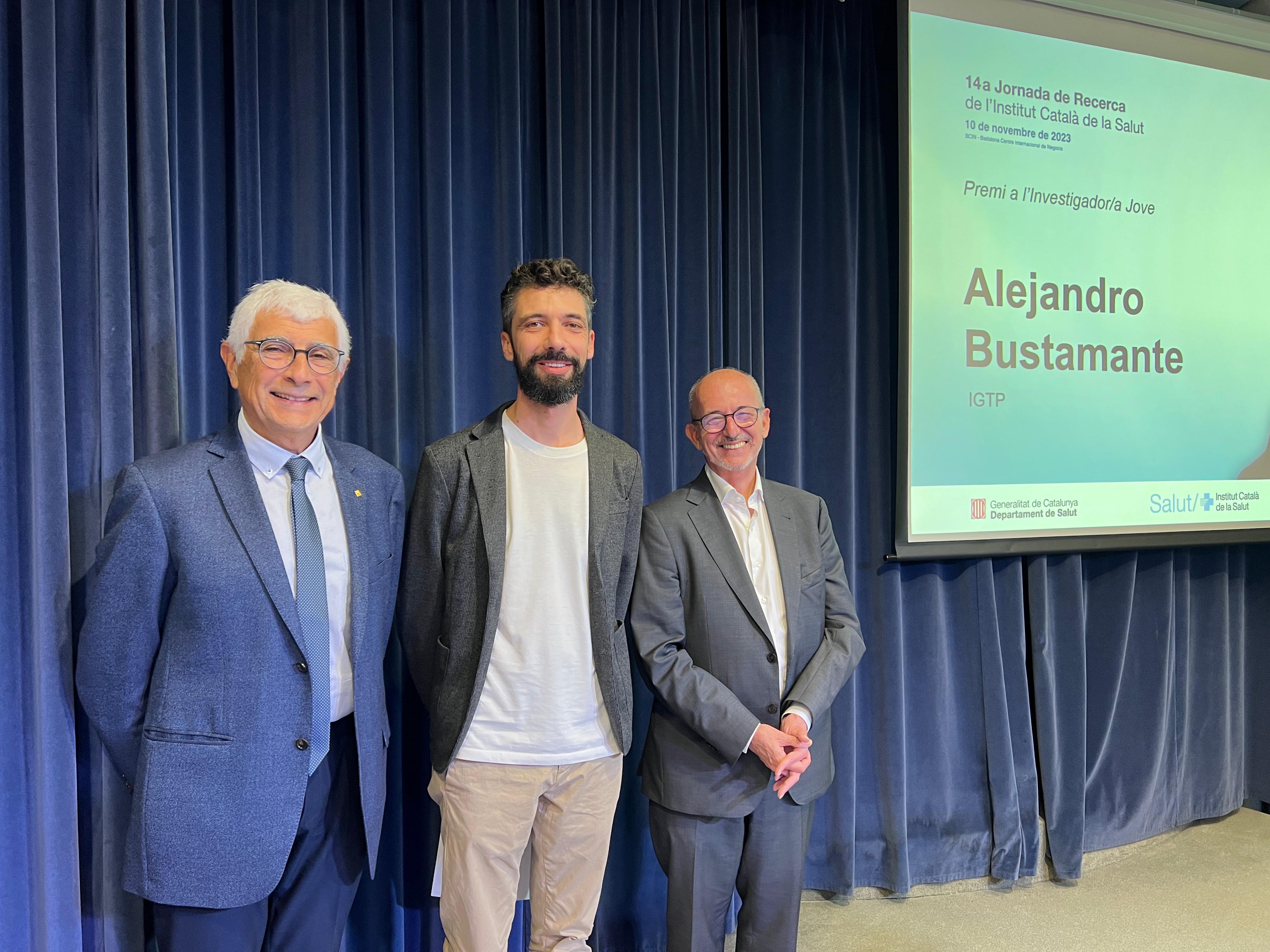
He holds a PhD in Medicine from the UAB and is currently an assistant doctor in the Stroke Unit of the Neurology Service of the Germans Trias Hospital and researcher in the Neurovascular Research Group of the IGTP. He has developed a research oriented to the search for blood biomarkers in the various stages of stroke, from diagnosis to prognosis prediction, which allowed him to defend his doctoral thesis in 2016. Since then, his research has focused on the study of complications that occur after stroke and impact on patient health, especially stroke-associated pneumonia. In recent years, his research activity has focused on the complications experienced by stroke patients in the chronic phase. It is currently developing, in coordination with Rehabilitation and Primary Care, the Camí project for the coordination and accompaniment of stroke patients in this phase.
He is a member of scientific societies such as the Spanish Society of Neurology and the European Stroke Organization. His professional career has been considered exceptional, especially his scientific production with a high number of publications (more than 100) in which he is first author or corresponding author in a significant number. His ability to attract competitive funding is also valued and, more specifically, the fact that he has been principal investigator of two projects, funded by La Marató de TV3 and the Instituto de Salud Carlos III, respectively, and his participation as a researcher in other projects on neurovascular pathologies, or the Río Ortega and Juan Rodés contracts.
You can check all the winners in this link.
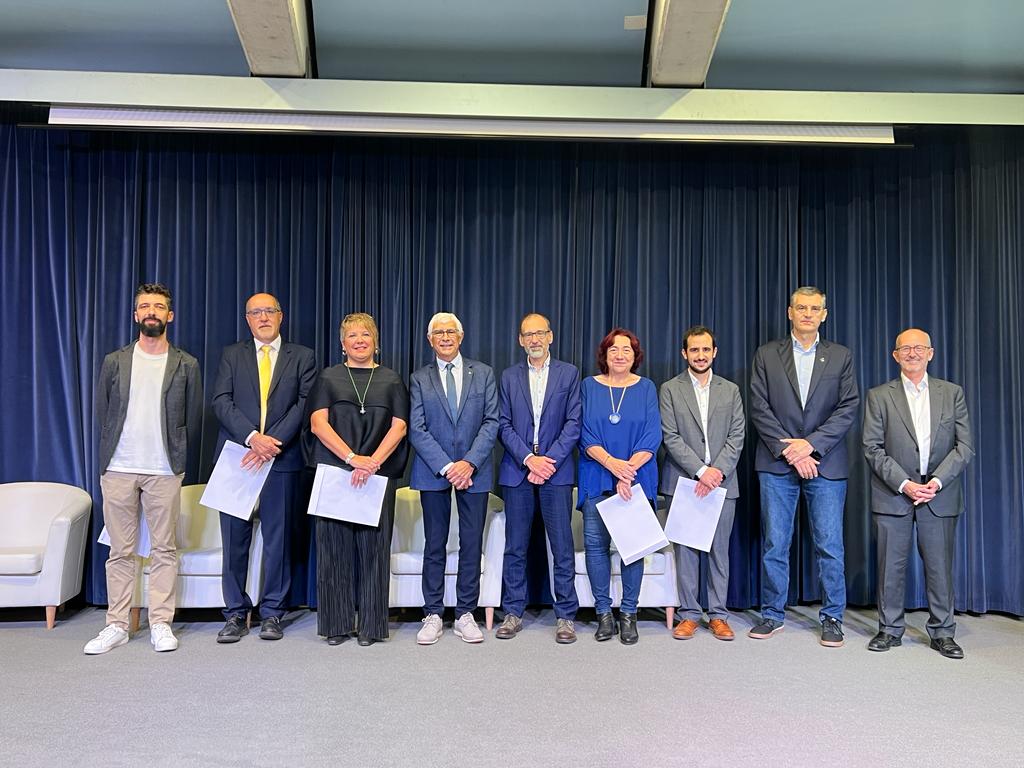
The event was concluded by the Minister of Health, Manel Balcells, along with the director of IGTP, Jordi Barretina. The latter commented: "Research institutes, hospitals, and primary care are fundamental in our health system, confirming the volume and importance of biomedical research and becoming agents of systemic transformation. The future will be marked by research and innovation events like today's". He added that "the research support staff add value and help to make it possible to manage research effectively. The focus must be on being a resilient collective and demanding resources to make our work significant and compete at the highest level".
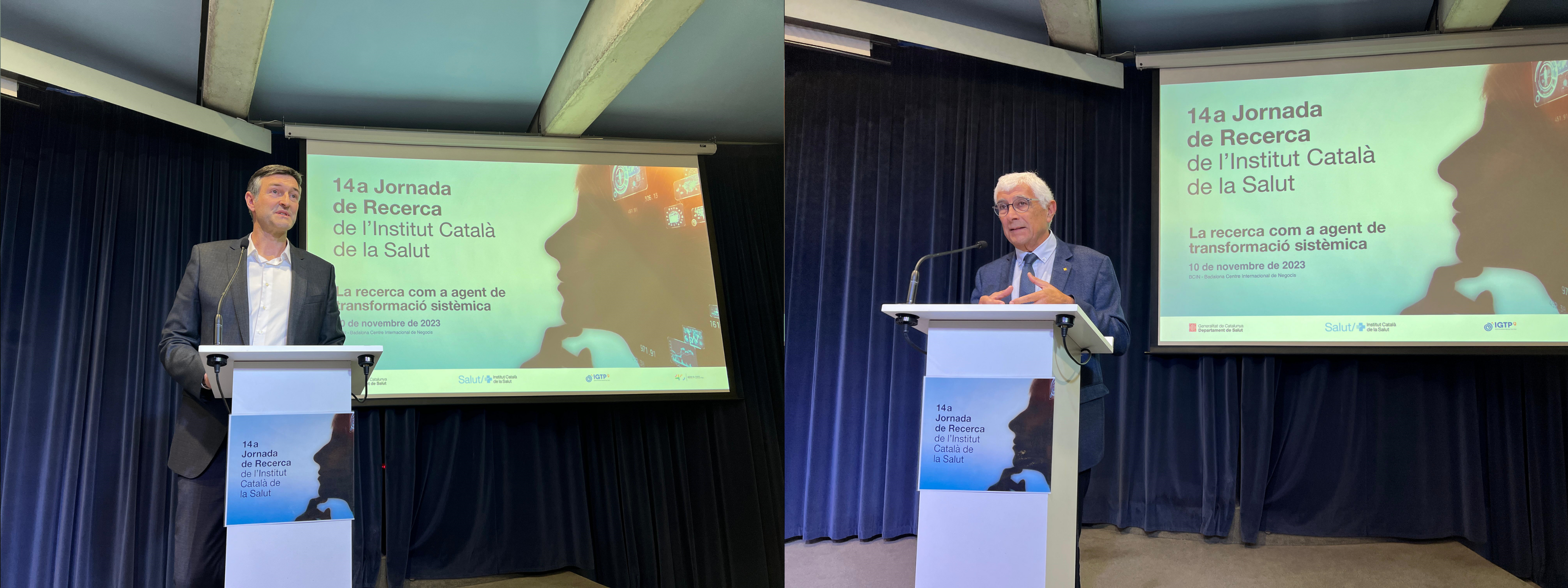
The event is an annual opportunity to see first-hand all the work being carried out by the nearly 5. 5,000 researchers from the seven research institutes of the ICS: Bellvitge Biomedical Research Institute (IDIBELL), which manages the research carried out at Bellvitge and Viladecans hospitals; Vall d'Hebron Research Institute (VHIR); Germans Trias i Pujol Research Institute (IGTP) in Badalona; the Institute of Biomedical Research of Lleida (IRBLleida); the Institute of Biomedical Research of Lleida (IRBLleida); and the Institute of Biomedical Research of Lleida (IRBLleida); the Institute of Biomedical Research of Lleida (IRBLleida); the Pere Virgili Health Research Institute (IISPV), which manages research at the Joan XXIII University Hospital in Tarragona and the Virgen de la Cinta Hospital in Tortosa; the Institute of Biomedical Research of Girona Dr. Josep Trueta (IDIBGI); the Institute of Biomedical Research of Girona Dr. Josep Trueta (IDIBGI), which manages research at the University Hospital of Tarragona and the University Hospital of Girona Dr. Josep Trueta (IDIBGI). Josep Trueta (IDIBGI), and the Jordi Gol Primary Care Research Institute (IDIAPJGol). The ICS carries out a great deal of scientific activity with almost 5,500 articles published this year in indexed journals and 85.8 million euros raised for research projects.
